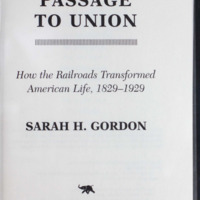-
Title
-
Passage to Union: how the railroads transformed American life, 1829-1929.
-
Description
-
In Passage to Union, Sarah Gordon has written a richly informed narrative history of the growth of the railroads, an American icon. But her conclusions are surprising. Where the railroads and their entrepreneurs are ordinarily celebrated for their accomplishments, Ms. Gordon finds that the cost of their achievements was high. Conflicts of interest - at local, state, and regional levels - characterized railroad growth at every stage. Despite the stated aims of government.and the railroad corporations to promote settlement and commerce, Ms. Gordon shows that the states lost control of these enterprises and lost the economic benefits of their traffic. Smaller towns withered as people and money flowed to larger cities. By 1900 the union that had emerged reflected the worst fears of railroad critics. The South and West had been settled, but wealth had flowed so heavily to the cities that rural life had lost its attraction. Passage to Union.is compelling reading because Ms. Gordon has drawn from diaries, memoirs, literature, advertisements, newspapers and magazines, public records, and railroad history to construct her narrative. The impact of the railroads on people and their communities is powerfully illustrated in this absorbing story of apparent triumph and real loss.
-
Identifier
-
2500174
-
1566631386
-
Creator
-
Gordon, Sarah
-
Source
-
Brian Lamb Booknotes Collection
-
Gift of Brian Lamb, 2011.
-
Catalog record
-
Language
-
eng
-
Date
-
1996
-
Program air date: March 9, 1997
-
Publisher
-
Ivan R. Dee
-
George Mason University. Libraries. Special Collections & Archives
-
Text
-
Transcription of Annotations
Notes on front endpapers: 1. What influence did steamboats have on railroads; 2. Role of slavery; 3. Southerners didn't want unity. The Pullman Palace Cars, Emigrant cars, 2nd Class cars. Nathan Hale. 1893 Edward Everette Hale; Nancy Hale, 1958. Cornelius Vanderbilt. Daniel Drew p. 109. Manipulation of city and state officials. Children's Aid Society 1853, p. 44. Presidential candidates chosen by Congress. 1840 Because of railroads chosen in convention. What was the charter systems. Union Station, heat, ladies car, smoking, Sunday travel. 1907-1564The most railroads; 1930-429883 miles of tracks. 1828 1st railroad? Charles Dickens' American Notes. 1850s 9,021 miles to 30, 626 in 10 yrs. 1853-138 train wrecks p. 112. Role of states and federal regulations p. 115. [verso] The stagecoach. p. 121 the mail; Pony Express went out of business after telegraph in 1861 (eastern 1847). Civil War-speed of Northern mobilization due to railroads. In the South--states rights prevented fast connections. Car v. railroad after WWI. Individualism v. Central authority--no legs out the window. Quote of John W. Foster p. 281--important guests to his lodge. Notes on half-title: George Westinghouse, George Pullman. 1887--creation of ICC. 1850s some states call it a common carrier. [verso] p. 122 Albert Koch--German paleontologist. Frederika Brewer--William Chambers--Scottish travel writer. Anthony Trollope p. 135. Underlinings/Notes: Underlinings: Details on conflict between states/businesses/federal government, conflicts between northern/southern/western states, changes in technology, movement of people to the West. Notes: "Laws changed," "1861," "Civil War," "1865 to 1917," "Railroad barons," "save time," "rural," "population 1800, 1845," "water routes," " 1830 passenger service," "Erie Canal 1825," "state charters," "1840 Supreme Court," "Penn.," " speed limit 18 mph," "over 12 yrs. one penny a mile," "New York, 1831," "canal froze," "1832 Michigan," "Chicago," "Ill--1st RR 1836," "speed," "steam locomotives," "cow catcher," "American style passenger cars," "social revolution in Eastern cities," "poor went west," "size of steamboats," "Nathan Hale," "undercut local control," "charters, terms of charters," "railroads wanted protection," "eminent domain," "animals on the tracks," "Ohio, PA," "Jacob Richardson sued Boston and Lowell," "1849-1850," "Walt Whitman," "1838 JFC greed vanity," "Thoreau, Dickens," "Mr. Smooth-It-Away," "Cooper, Hawthorne 15 yr. younger than C., Whitman-15 years younger than H.," "telegraph late 1840s," "8 to 30 people, wood construction, candles, coal stoves," "Dickens stove," "Boston to Albany," "black pass., ladies car for singles," "1830s stations Boston," "fires in stations," "often delays," "after Civil War," "1828 night travelers," "rough gamblers," "Ladies," "the South," "black laborers," "limbs out the windows," "conductors and guns," "Andy Jackson, the King Mob," "Nov. 29, 1852 Pittsburgh. Gold 1848," "slavery," "Vanderbilt," "Drew," "manipulation of city and state officials," "Indiana," "Abe Lincoln," "Knox College," "role of state and federal regulation, the bridge," "William Seward," "connect all points," "bridges impede navigation," "the mail," "Doggett's Guide, Pathfinder Railway guide, American Railway guide," "Lincoln, Jeff Davis," "Anthony Trollope," "profits for North," "Manassas," "Chattanooga," "supply lines," "trains for wounded," "hospital train," "George Mortimer Pullman," "1862 Pacific Railroad Act," "1800 miles of track," "Credit Mobilier, Homestead Act," "Morrill Act," "federal land grant," "Robert Lewis Stevenson," "Jesse James," "Pinkerton," "the poor rode free," "1869-70 to 80 Southern railroads," "1873 to 1877 consolidation," "emigrant car," "absence of system of national laws," "1880s freight," "Time, telegraph office," "Harvey House," "Union Station," "private cars," "cooked," "woman travelling alone," "lower your veil," "different gauges," "Rich & Poor," "H.G. Wells," "fast trains," "metal cars," "George Westinghouse," "Steam," "Massive inflation," "1920s curtail services; great reversal of service," "States lose control," "ICE 1887," "Cleveland Sherman Act," "1917 advance of federal authority," "automobile," "the car v. railroads," "Pullman sleepers 1880-1930," "20th century limited," "corrupt politicians," "Penn S 1906, Grand C 1913," "underground," "1880s rebuilt encouraging Northerners to go South," "Raymond's tours," "J.P.Morgan, George Vanderbilt 1889, Henry Flagler, John P. Rock," "1900 to 1920, W.C. Handy," "Jelly Roll Morton, Carter Family, Jimmy Rodgers," "mass conventions," "Henry Adams," "Bronx," "Chicago," "traveling salesmen," "murder mystery," "leaving home," "tramps, hoboes, criminals," "freedom," "Gypsies," "Model T," "railroad magnates," "politicians," "centralized control," "profit."
-
Subject
-
"Railroads--United States--History."
-
Relation
-
Original Booknotes interview
-
Rights
-
This work may be protected by copyright laws and is provided for educational and research purposes only. Any infringing use may be subject to disciplinary action and/or civil or criminal liability as provided by law. If you believe that you are the rights-holder and object to Mason’s use of this image, please contact speccoll@gmu.edu.
 2500174.pdf
2500174.pdf